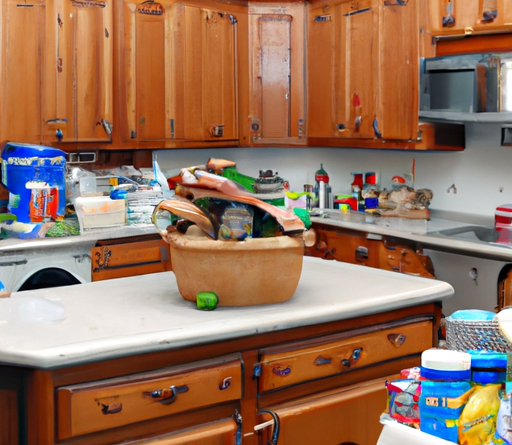In our article, we will explore the topic of safely storing cleaning supplies in the kitchen. With so many different products and chemicals used for cleaning, it’s important to know how to store them properly to avoid any accidents or potential harm to ourselves and our loved ones. We’ll provide helpful tips and suggestions on organizing and storing your cleaning supplies in a way that promotes safety and maintains a clean and clutter-free kitchen. Keep reading to learn more about this important topic!

1. Store in a Cool and Dry Place
When it comes to storing cleaning supplies in the kitchen, it’s important to find the optimal location that will keep your products in their best condition. A cool and dry place is ideal for storing cleaning supplies as it helps preserve their efficacy and prevents any potential hazards.
1.1 Use a Dry Cupboard or Pantry
One of the best places to store your cleaning supplies in the kitchen is a dry cupboard or pantry. These dedicated spaces provide a suitable environment to keep your products away from environmental factors that could compromise their quality. Make sure to choose a cupboard or pantry that is well-ventilated to prevent moisture buildup.
1.2 Avoid Storing Near Heat Sources
It is crucial to keep cleaning supplies away from heat sources in the kitchen. Heat can not only affect the potency of certain cleaning agents but also pose a fire hazard, especially when it comes to flammable products. To ensure the safety of your cleaning supplies, be mindful of where you place them and avoid storing them near ovens, stovetops, or other heat-emitting appliances.
1.3 Keep Away from Humid Areas
Humidity can have a detrimental effect on the quality and effectiveness of cleaning supplies. Moisture can cause products to clump, lose their potency, or even breed harmful bacteria. To prevent this, it’s essential to store your cleaning supplies away from humid areas in the kitchen, such as near sinks or dishwashers. Opt for dry locations like a cool pantry or cupboard where the humidity level is relatively low.
2. Organize and Categorize
Keeping your cleaning supplies organized not only makes your kitchen look tidier but also helps you find what you need quickly and easily. By categorizing and arranging your cleaning products efficiently, you can maximize their lifespan and ensure they are readily accessible when you need them.
2.1 Group Similar Items Together
Start by grouping similar cleaning items together. For example, keep all-purpose cleaners, glass cleaners, and surface disinfectants in one area. By doing so, you’ll be able to locate the cleaning supplies you need without rummaging through different storage areas. It also helps you keep track of when you are running low on specific products, so you can restock in a timely manner.
2.2 Label Containers or Shelves
Labeling containers or shelves is an effective way to maintain an organized supply storage system in the kitchen. By clearly labeling each storage area, you and others in your household will know exactly where to return items after use. It also reduces the risk of accidentally using the wrong cleaning product, especially in the case of potentially harmful or toxic substances.
2.3 Create Zones for Different Cleaning Tasks
Consider creating separate zones within your storage space for different cleaning tasks. For instance, designate one area for dishwashing supplies, another for surface cleaners, and a separate section for specialized cleaning products such as oven cleaners or stainless steel polish. This way, you can easily identify which zone to access based on the cleaning task at hand, streamlining your cleaning routine.

3. Use Childproof Storage Solutions
If you have young children at home, it’s crucial to take extra precautions to ensure the safety of your cleaning supplies. Childproof storage solutions can help prevent accidents and safeguard your little ones from potentially harmful substances.
3.1 Install Child Safety Locks
Install child safety locks on cabinets or drawers where you store your cleaning supplies. These locks serve as a barrier, preventing curious children from accessing the products inside. Choose locks that are specifically designed for cabinets containing cleaning chemicals to ensure utmost safety.
3.2 Store Hazardous Chemicals Out of Reach
Certain cleaning supplies contain hazardous chemicals that can pose serious risks if ingested or mishandled by children. It’s of utmost importance to store such products out of reach, preferably in high cabinets or shelving units. Opt for storing them at a height that your child cannot reach, ensuring their safety and minimizing potential accidents.
3.3 Secure Cabinets and Drawers
In addition to child safety locks, reinforce the security of your storage cabinets and drawers by properly securing them. Use latches or locks that require adult strength or supervision to open. This extra layer of security ensures that even if a child somehow manages to reach the storage area, they won’t be able to access the cleaning supplies inside.
4. Avoid Food Contamination
Maintaining proper hygiene in the kitchen is essential, and this includes preventing any cross-contamination between cleaning supplies and food items. Keeping your cleaning supplies separate from your food storage areas helps ensure that you aren’t accidentally contaminating your meals.
4.1 Separate Cleaning Supplies from Food Items
To avoid any mix-ups or accidental contact, it’s essential to store your cleaning supplies away from food items. Designate different cabinets or shelves for each category and keep them well-separated. By doing so, you minimize the risk of cross-contamination and maintain a clean and safe kitchen environment.
4.2 Use Airtight Containers for Powders and Tablets
Some cleaning supplies come in the form of powders or tablets, which can easily spill or contaminate nearby food items. To prevent this, transfer these products into airtight containers. Not only will this help maintain the integrity of the cleaning agent, but it also ensures that there is no accidental dispersion of the product onto food surfaces.
4.3 Store Dishwashing Liquids Away from Food Storage Areas
While dishwashing liquids are essential for cleaning your dishes and utensils, it’s crucial to store them separately from your food storage areas. Even if they are not food items themselves, dishwashing liquids can come into contact with your utensils, plates, and glasses. To ensure proper hygiene, store them in a location away from your food storage zones.

5. Prevent Leaks and Spills
Leaks and spills can not only create a messy and potentially hazardous situation but also result in wastage of cleaning supplies. By taking preventive measures, you can minimize the risk of leaks and spills, keeping everything tidy and ensuring the longevity of your cleaning products.
5.1 Check for Proper Sealing of Bottles and Containers
Before storing your cleaning supplies, always check for the proper sealing of bottles and containers. This is especially important for liquid products like surface cleaners or disinfectants. Faulty seals can lead to leaks and spills, causing a mess inside your storage area. Tighten the lids securely to prevent any mishaps.
5.2 Store Liquids in Leak-proof Bottles
Invest in leak-proof bottles for your liquid cleaning supplies. These bottles are designed to prevent any accidental leaks or spills, providing an extra layer of protection. By choosing leak-proof bottles, you can have peace of mind knowing that your cleaning supplies are securely contained and won’t cause any mess or wastage.
5.3 Use Drip Trays or Liners
Consider using drip trays or liners inside your storage area to catch any drips or spills. These can be particularly useful if you have bottles with faulty seals or containers that are prone to leakage. By utilizing drip trays or liners, you can easily clean up any spills without having them spread to other areas within your storage space.
6. Secure Flammable Materials
It’s essential to take special precautions when storing flammable cleaning supplies in the kitchen. Flammable materials pose a significant fire hazard, and proper storage and handling are crucial to minimize the risk of accidents.
6.1 Keep Flammable Cleaners Separate
Store flammable cleaning supplies separately from other non-flammable products. This helps prevent any potential reaction or ignition in case of leaks or spills. It’s recommended to have a dedicated storage area for flammable cleaners, preferably in a well-ventilated space away from heat sources and open flames.
6.2 Store in Fire-Safe Cabinets
To further ensure the safety of flammable cleaning supplies, consider storing them in fire-safe cabinets. These cabinets are specifically designed to prevent the spread of fire and contain any flames in case of an incident. Fire-safe cabinets provide an extra layer of protection and are an excellent investment to mitigate the risks associated with storing flammable materials.
6.3 Follow Safety Guidelines for Combustible Items
When storing flammable cleaning supplies, it’s crucial to follow the safety guidelines provided by the manufacturers. These guidelines typically include recommendations regarding temperature limits, suitable storage conditions, and handling instructions. Make sure to read and understand these guidelines to ensure the correct storage and usage of flammable materials in your kitchen.

7. Properly Dispose of Old or Unused Cleaning Supplies
Over time, cleaning supplies may become expired, obsolete, or no longer needed. It’s important to follow proper disposal methods to minimize environmental impact and ensure the safety of waste management personnel.
7.1 Check Expiration Dates
Regularly check the expiration dates of your cleaning supplies, especially those that have a shelf life. Expired products may lose their effectiveness or even become potentially harmful. Properly dispose of any expired items according to local guidelines or recommendations provided with the product.
7.2 Follow Local Guidelines for Disposal
Different jurisdictions may have specific guidelines and regulations for the disposal of cleaning supplies. It is crucial to follow these guidelines to ensure compliance and minimize any adverse effects on the environment. Contact your local waste management authorities or visit their website for information on how to properly dispose of cleaning supplies in your area.
7.3 Don’t Pour Chemicals Down the Sink
One common mistake when disposing of cleaning supplies is pouring chemicals down the sink or drain. This can lead to water contamination and pose a risk to the environment. Avoid this by following the disposal instructions provided on the product labels or seeking guidance from local authorities on safe disposal methods.
8. Store Cleaning Tools Properly
Cleaning tools are just as important as cleaning supplies, and storing them properly ensures their longevity and keeps your kitchen organized. Implementing suitable storage solutions for your cleaning tools helps prevent damage and makes them easily accessible when you need them.
8.1 Hang Brooms and Mops
Hang brooms and mops to keep their bristles in good condition. Storing brooms and mops upright helps prevent the bristles from becoming bent or misshapen. Install wall-mounted hooks or use a hanging storage system designed specifically for brooms and mops to keep them organized and easily accessible.
8.2 Use Hooks or Racks for Brushes
Brushes such as scrub brushes or bottle brushes can accumulate dirt and debris if not stored properly. Using hooks or racks to hang brushes ensures that they stay clean and dry between uses. Hang them upside down to allow any excess moisture to drip off, preventing unpleasant odors or bacterial growth.
8.3 Store Vacuum Cleaners in a Clean Area
When it comes to storing vacuum cleaners, choose a clean and dry area away from dust or other potential contaminants. Make sure the vacuum cleaner is free of any debris or dirt before storing it. Additionally, consider wrapping the power cord neatly around the vacuum cleaner or using a cord management system to prevent damage or tripping hazards.

9. Keep Safety Equipment Handy
Safety should always be a top priority when handling cleaning supplies. Having safety equipment readily available ensures you can protect yourself and others in case of accidents or emergencies.
9.1 Store Gloves and Masks in a designated area
Keep gloves and masks in a designated area close to your cleaning supply storage. This way, you can easily access them when needed. Gloves protect your skin from potential irritants or chemicals, while masks help prevent inhalation of harmful fumes or particles. Store them in a clean and dry location to maintain their effectiveness.
9.2 Keep Emergency Contact Numbers Available
In case of emergencies or accidental ingestion of cleaning supplies, it’s crucial to have emergency contact numbers readily available. Keep a list of important phone numbers, such as poison control centers and emergency medical services, in a visible and accessible location. This ensures that immediate help can be sought when necessary.
9.3 Have a First Aid Kit Nearby
Accidents can happen even with the utmost precautions. Having a well-stocked first aid kit in the kitchen is essential for treating minor injuries promptly. Make sure your first aid kit is easily accessible and regularly checked to ensure that all items are up to date and in working order.
10. Regularly Check and Replace Containers
Containers and storage solutions can deteriorate over time, compromising the integrity of your cleaning supplies. Regularly inspecting and replacing damaged containers helps maintain the quality and safety of your stored cleaning products.
10.1 Inspect for Damaged Bottles or Containers
Inspect your cleaning supply containers regularly for any signs of damage, including cracks, leaks, or misshapen lids. Damaged containers can lead to spills, leaks, or exposure to harmful substances. Replace containers that show signs of wear and tear to avoid accidents or weakened product efficacy.
10.2 Replace Worn-out or Cracked Storage Solutions
Storage solutions, such as cabinets, shelves, or bins, may also become worn out or damaged over time. Cracked or unstable storage solutions can pose a safety risk, especially if they are holding heavy cleaning supplies. Regularly assess the condition of your storage solutions and replace any that are no longer sturdy or secure.
10.3 Discard Rusty or Corroded Containers
Rusty or corroded containers should never be used to store cleaning supplies, as they can contaminate the products and compromise their effectiveness. Inspect containers and check for any signs of rust or corrosion regularly. If any are found, it is best to discard them and replace them with new containers to ensure the safety and quality of your cleaning supplies.
By following these guidelines and implementing proper storage practices, you can ensure the safe and effective use of your cleaning supplies in the kitchen. Not only will you create a clean and organized space, but you will also enhance the longevity and efficacy of your products. Remember, a well-maintained and properly stored cleaning arsenal is essential for a healthy and hygienic kitchen environment.









